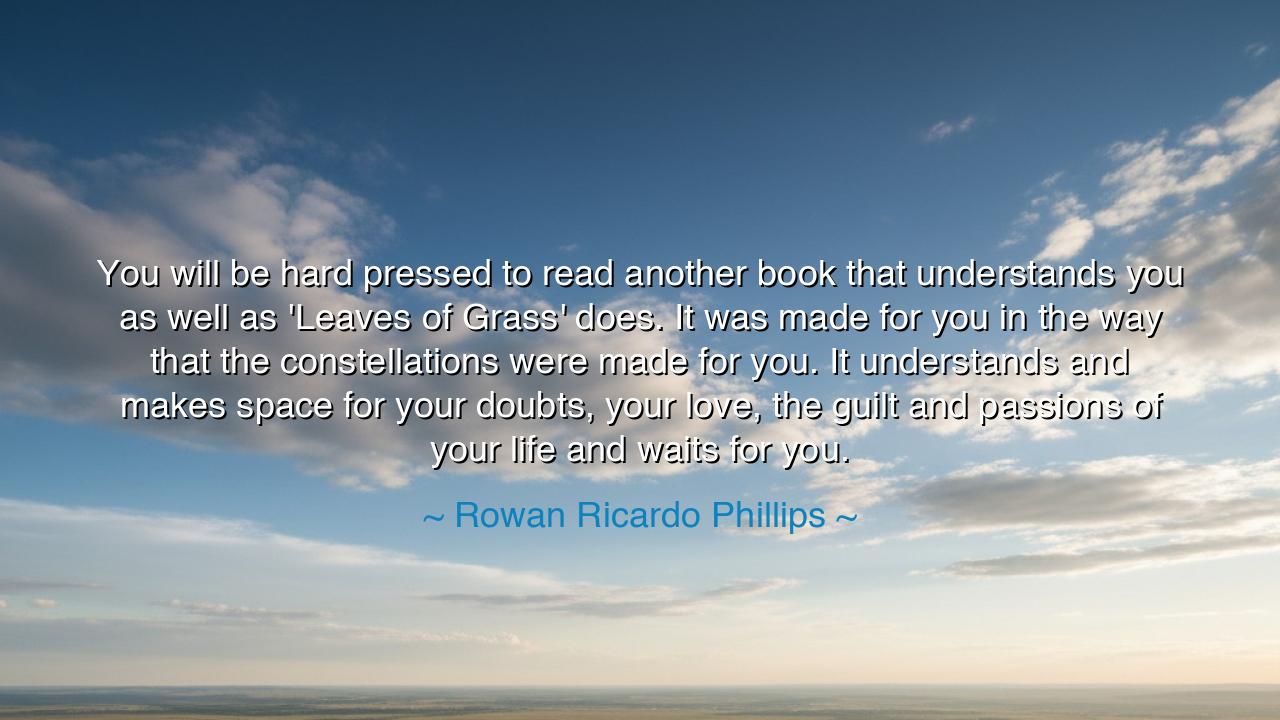
You will be hard pressed to read another book that understands
You will be hard pressed to read another book that understands you as well as 'Leaves of Grass' does. It was made for you in the way that the constellations were made for you. It understands and makes space for your doubts, your love, the guilt and passions of your life and waits for you.






Hear, O lovers of words and seekers of truth, the tender wisdom of Rowan Ricardo Phillips, who proclaimed: “You will be hard pressed to read another book that understands you as well as Leaves of Grass does. It was made for you in the way that the constellations were made for you. It understands and makes space for your doubts, your love, the guilt and passions of your life and waits for you.” These words do not merely speak of poetry, but of companionship, of a text that breathes with the soul of the reader, as though it were alive, as though it were made by the hand of creation itself.
The origin of this saying lies in Walt Whitman’s great masterpiece, Leaves of Grass. Whitman, prophet-poet of America, sought not merely to record his thoughts but to embrace the entirety of human experience. His verses sang of body and soul, of cities and fields, of democracy and desire, of the sacred and the profane. Unlike other works that demand you enter their world, Leaves of Grass enters yours. It waits patiently, like a friend, until you are ready. Thus, Phillips speaks truly: it is as if the constellations themselves had been placed in the sky not only to light the night but to whisper meaning into your heart.
Consider how Whitman himself walked the streets during the Civil War, tending to the wounded in hospitals. His poems were not lofty abstractions but the blood and breath of the people, the suffering and the joy of ordinary men and women. He wrote as though speaking directly to you—not to scholars or kings, but to the carpenter, the soldier, the mother, the lover. That is why, across generations, readers feel known by him. They sense that Whitman has made space for their contradictions: their doubts, their longing, their hidden guilt, their restless passions. Few books dare to contain so much of humanity without judgment.
History has shown the transformative power of such works. Just as The Bible has offered solace to countless souls, and as the writings of Marcus Aurelius have guided seekers of inner discipline, so too has Whitman’s Leaves of Grass been a lamp for wanderers. Soldiers in the trenches carried it in their pockets; immigrants learning English found in it a new language of belonging. Like the constellations, it has been a map not of stars alone but of the human spirit.
Phillips’s words remind us of the eternal truth: the greatest works of art are not static monuments, but living companions. They do not only inform; they transform. They do not only speak; they listen. And Leaves of Grass, in particular, offers an intimacy so deep that the reader feels understood, forgiven, embraced. It is no small thing to say that a book can hold your love, your doubts, your guilt, and still wait patiently for you to return.
Therefore, O listener, the lesson is clear: seek out the works that speak to your soul, and when you find them, cherish them. Do not treat them as mere entertainment, but as sacred encounters. Allow them to reflect your life back to you, to awaken what is hidden, to soothe what is wounded. For in such books, as in the stars, you may glimpse your own place in the great design.
Practical action lies before you. If you have not yet read Leaves of Grass, open it and let its voice meet yours. Read slowly, not to finish, but to converse. And beyond Whitman, find the texts that make you feel known, whether they be sacred scriptures, poems, or letters from those you love. Let them guide you as the constellations guide sailors, and return to them as to old friends who never abandon you.
So remember the teaching of Rowan Ricardo Phillips: there are few books that understand you as Leaves of Grass does. It was made for you, as the stars were made for you, to light your path, to embrace your whole being, and to wait patiently until your heart is ready to hear its song. And when you do, you will know that you were never truly alone.






AAdministratorAdministrator
Welcome, honored guests. Please leave a comment, we will respond soon